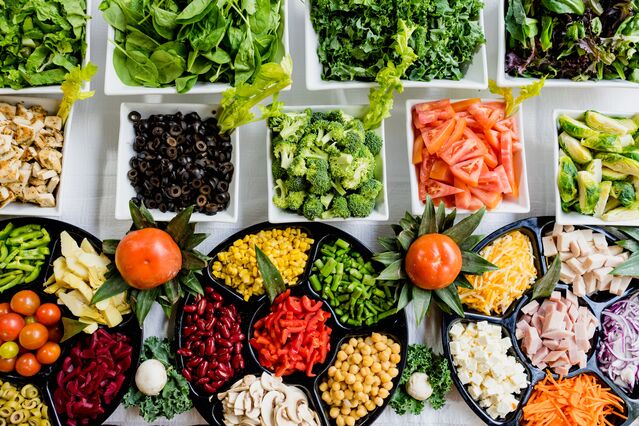Sleep
How Food Can Help Your Sleep
How often do you think about the connection between nutrition and sleep?
Posted March 10, 2022 Reviewed by Vanessa Lancaster
Key points
- The right foods can encourage better sleep efficiency, healthier sleep onset latency, and may even contribute to more restorative deep sleep.
- One study found that 20 percent of calories consumed as protein produce the most favorable effect on sleep.
- Eating nutrients such as B vitamins from whole grains, magnesium from leafy greens, and zinc from nuts and legumes may help you get better sleep.

The foods you eat during the day can impact how well you sleep each night. A wholesome, healthy diet contributes to better, more restful sleep, while a poor diet contributes to poor sleep quality and short sleep duration. The right foods can encourage better sleep efficiency, healthier sleep onset latency—the time it takes you to fall asleep—and may even contribute to more restorative deep sleep.
In an article published in Sleep Review Magazine, Jose Colon dove into the details of sleep and nutrition.
Here are a few highlights that stood out:
When it comes to diets that are good for sleep, there is not a definitive “best.” However, a variety of whole foods and a low-glycemic diet are good places to start. It’s important to keep your macronutrients in mind also.
- Protein: A low protein intake is associated with short and long sleep times—both are bad since you want between seven and nine hours of sleep each night. One study found that 20 percent of calories consumed as protein produce the most favorable effect on sleep.
- Carbs: Carbohydrates are helpful for sleep, but the type of carb matters. Your carbohydrate intake should primarily consist of wholesome, high-fiber foods like whole grains, fresh fruit, and vegetables—sugar leads to excessive daytime sleepiness, and fiber leads to better overall sleep and less daytime sleepiness.
- Fats: A low-fat diet was associated with non-restorative sleep and excessive daytime sleepiness. High-fat ketogenic diets—better known as Keto—have been associated with improved sleep quality, increased REM sleep, and increased slow-wave sleep.
I’m not advocating for the Keto diet by reporting this—I’m just providing you with information that may be useful in making better food choices throughout the day to support sleep.
Looking at this data was interesting and made me think through a few of my food choices!
Other Nutrients That Can Improve Sleep
Macronutrients aren’t the only nutrients that matter for your sleep. Here are a few more that may surprise you:
B Vitamins: These are probably the best vitamins for sleep regulation. B1 helps with sleep patterns, B9 improves mood and sleep, and B12 can influence your circadian rhythm. B vitamins can be found in whole grains, dark leafy vegetables, meat, and dairy products.
Magnesium: Magnesium is a mineral found in foods like leafy greens, nuts, beans, and seeds. It helps regulate your sleep schedule and melatonin production. Magnesium is also available in supplements.
Zinc: This mineral can be found in foods like nuts and legumes. Research has found that low zinc levels in children can negatively affect sleep patterns.
Melatonin: Commonly known as “the sleep hormone,” melatonin is vital to a good night’s sleep. Many foods are naturally high in melatonin and can help you sleep better.
Tryptophan: You may be most familiar with this amino acid, thanks to its association with turkey and impromptu naps after Thanksgiving dinner. But tryptophan is actually present in many foods, ranging from poultry and fish to oats and even chocolate.
Omega-3 Fatty Acid: This is found in fish, grass-fed animal proteins, nuts and seeds, vegetable oils, and leafy green vegetables. Omega-3 promotes healthy sleep quality and supports a healthy circadian rhythm.
While there are plenty of foods that can help your sleep, many others can make getting a good night’s sleep more difficult.
Foods to Avoid for Better Sleep
Even if they contain the nutrients above, not all foods will help you sleep better. Be sure to avoid the following foods in the evening—your sleep cycle will thank you.
Caffeine: Many people rely on caffeine to get through the day, but thanks to its stimulating effect, drinking it too close to bedtime can make it harder for you to fall asleep on time. Instead, end your caffeine intake at six to eight hours before your normal bedtime. This ensures that the effect has diminished by when you’re ready for bed.
Spicy food: While delicious, spicy foods can cause indigestion and gastrointestinal discomfort and trigger IBS or acid reflux symptoms.
Chocolate: Chocolate’s high sugar content can keep you up at night, and some kinds—particularly dark chocolate—may also contain caffeine.
Pizza: While an easy dinner solution, pizza can make getting a good night’s sleep harder. The combination of refined carbs, saturated fat, and an acidic sauce can cause sleep problems by slowing digestion and causing inflammation and, potentially, acid reflux.
If you’re still figuring out your ideal diet or are struggling with your sleep health, I hope this gives you something to think about! You may not always think about how your diet can affect your sleep or vice versa, but they’re both important parts of the same whole when living life your healthiest.
Sweet Dreams,
Michael J. Breus, PhD, FAASM
The Sleep Doctor




